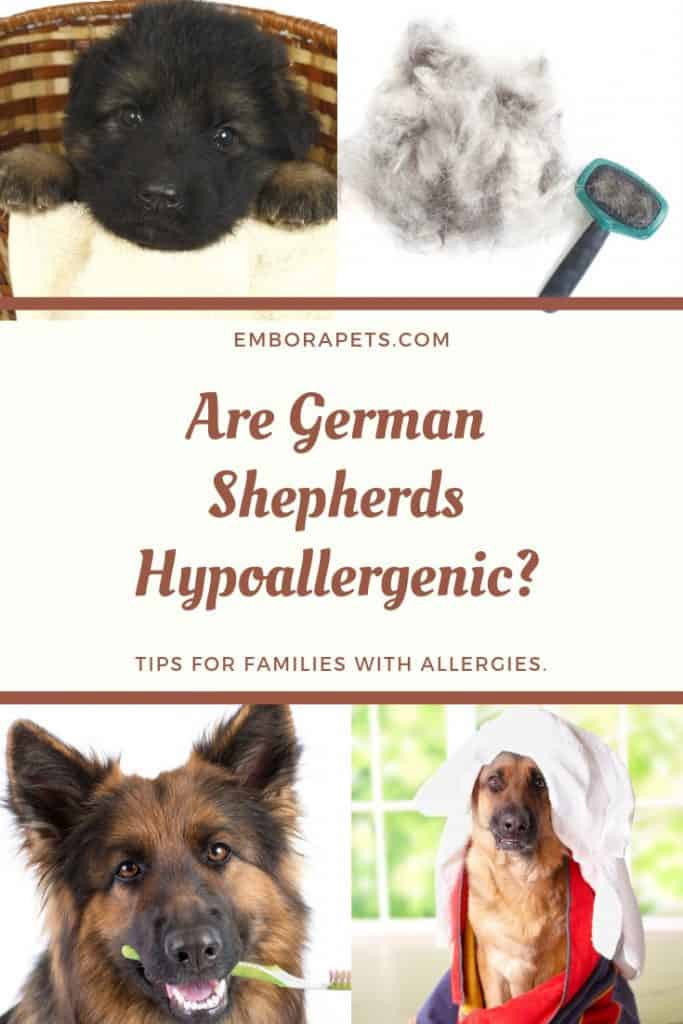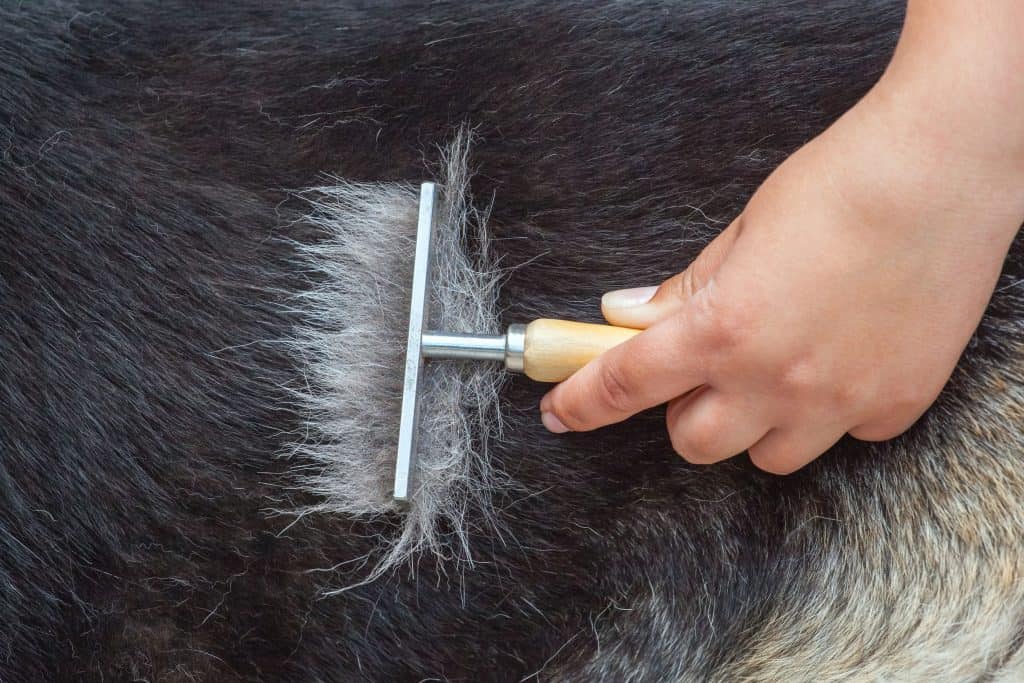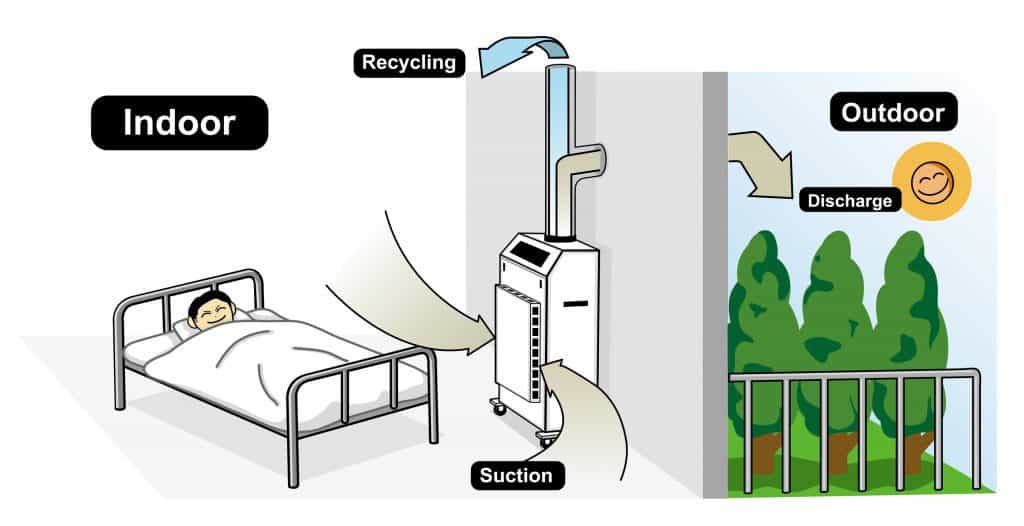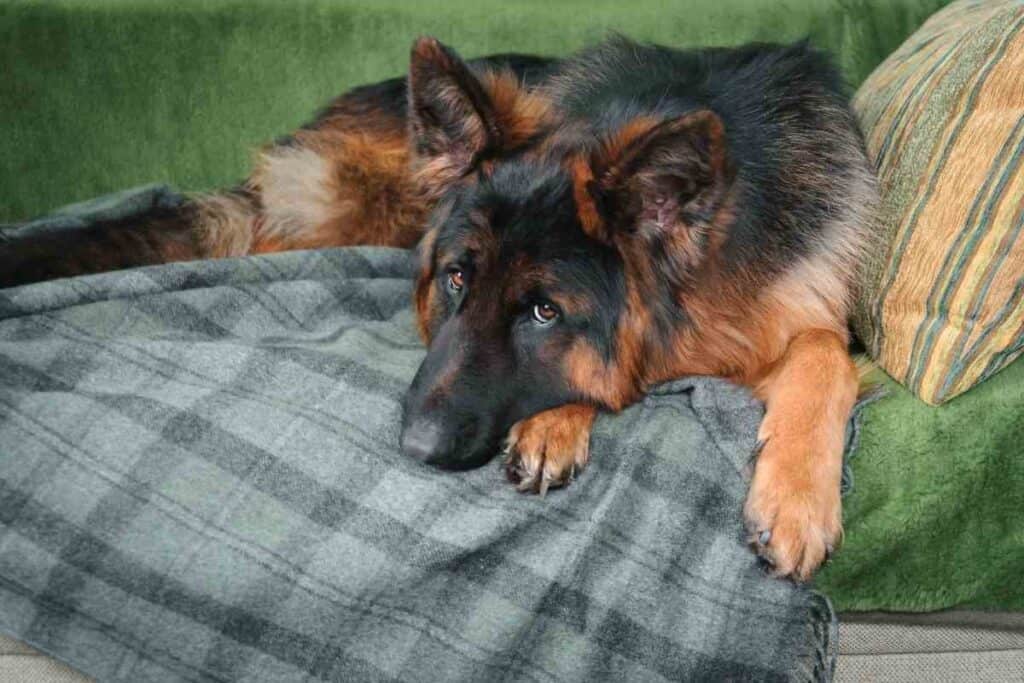Are German Shepherds Hypoallergenic? Tips for Families with Allergies.
I love German Shepherds, but my mom has dog allergies, meaning we never got one growing up. I want one someday, however, and so I decided to research if German Shepherds are hypoallergenic and how to live with one if not.

Are German Shepherds Hypoallergenic?
German Shepherds are not hypoallergenic dogs. They have fur that easily sheds and can irritate dog allergies in people that interact with them. Depending on the severity of the allergy, this can become an issue for some families, but not for all.
If, like me, a German Shepherd is a dog that you want, and you have family members with allergies, there are still some things that you can do to making living with a beloved companion possible.
Why Are German Shepherds Not Hypoallergenic?
There are some breeds of dog that are much more allergy-friendly than others. Unfortunately for German Shepherd lovers, they are not one of those breeds.
German Shepherds used to be herd dogs, as their name indicates. They needed thick fur in order to be able to handle to cold winters and cold mountain heights. Therefore, German Shepherds are built with double-coats and their fur is very thick, especially in the winter.
The undercoat is soft, close to the skin, and meant to keep your dog warm and dry, and it is used as insulation against harsh temperatures. The outer coat is longer, coarser, and meant to protect against snow and ice.
The double-coat means that these dogs shed all year, but they shed the largest amount as summer approaches. This is so that they don’t overheat in the sun and so they are able to enjoy the outdoors during that time much better. If they didn’t shed so much for the summer, they would insulate too much and become too hot and run the risk of heat stroke or even death.
While they do shed the most in the summer, they will still shed their fur year-round, much like how people lose several hairs of their head every day, just through the natural course of things.
While all of this shedding is necessary, it can be aggravating for people who don’t have allergies, as it can get all-around a house. For someone who deals with dog allergies, that can be a particularly difficult obstacle to overcome.
Some people think shaving their dogs is a viable option. For some breeds, that may work, but not for German Shepherds. They shouldn’t be shaved in the winter, because they need all that fur to keep them warm.
The fur also keeps them cool in the summer. Dog’s don’t sweat, and so they rely on other means to cool down. Shaving a German Shepherd in the summer gets rid of some of the insulation that will cool them down.
It also leaves it vulnerable to sunburn. And a German Shepherd would still shed, even if it were shaved, so it’s best to keep it healthy and protected and not shave it.
About Those Allergies
I have allergies to cats, which is sad to me because I love cats as well as dogs. However, this means I know how it feels to be allergic to a beloved animal. According to the Asthma and Allergy Foundation of America, almost 30% of people who deal with allergies are allergic to dogs or cats.
When talking about animal allergies, their fur isn’t actually the culprit, it’s the pet dander, or microscopic bits of skin that gets loose, that causes the problems. Dander is usually carried by the hair, however, so that’s why sometimes people say the fur is what bothers them.
Pet dander be transmitted in several ways. Directly touching the animal is one, but also getting the dander, though the fur or other means, on your skin or face can transmit it. It can also sometimes be breathed in, causing reactions like coughing and wheezing in the lungs. Sometimes direct contact of the dander with skin can lead to itchiness or rashes.
One of the more common symptoms, like what I deal with when around cats, is itchiness to the eyes, stuffy or runny noses, and occasionally inflammation.
You may already know you have allergies, or you may be like me, and discover them or develop them after years of living with your pet. Sometimes allergies just develop, and conversely, they may diminish as well.
All in all, being allergic to animals is not a pleasant experience, regardless of the level of severity you may face. But if you really love your pets, it can be made to be manageable.
Tips on How to Live With a German Shepherd and Allergies

Before getting a German Shepherd, it’s good to know your allergy tolerance and to evaluate your lifestyle. German Shepherds are sometimes known as “German Shedders” because of the amount they shed.
Someone with severe allergies may want to reconsider before getting this breed of dog. For others, their allergies are not too severe, and they may be willing to live with them in favor of their favorite breed.
Whether you plan on getting a German Shepherd or perhaps have one already and recently discovered your allergies, there are still things that you can do in order to make it manageable and create a happier home for both you and your pet.
1. Keep your German Shepherd Well-Groomed
German Shepherds shed a lot, but this can be somewhat controlled if they are kept well-groomed. If your allergies aren’t too bad, you may be able to do this yourself. If not, finding a non-allergic friend or family member to help can be a big blessing.
Brush your dog regularly, daily if possible. Do a thorough brushing at least once a week to keep on top of it.
Also bathe your dog regularly. What regularly means can vary, but the more often the better. Bathing your German Shepherd gets rid of old skin cells and dander and keeps those from falling out around the house.
Using a good shampoo and keeping their coat healthy can reduce shedding as well. Dry fur will shed more, so a clean and well-groomed dog will not leave as much fur and dander around.
You can also take your German Shepherd to a professional groomer if that’s preferable to you. They may be better able to keep them clean and reduce shedding.
Even well-groomed German Shepherds will cause allergies, however, so there are other things that you can do to reduce the issues that you have.
2. Consider Losing the Carpet
Pet dandruff can easily get locked into carpeted floors, and it can get stuck there forever. Having carpet and a German Shepherd is basically like having a complete floor of dander.
My family switched to hardwood floors and that made allergies so much more manageable. It’s much easier to sweep up a wood floor than attempt to thoroughly get rid of all the dander in the carpet.
If you can’t get rid of the carpet, however, then make sure you vacuum it often. Wear a mask when doing this so that the dander that flies around doesn’t get in your face.
Also remember that dander can get caught in fuzzy blankets and rugs, as well as couch cushions. Thoroughly clean these and keep up with that cleaning at least weekly so that it doesn’t become too much.
3. Have “Pet-Specific” Clothes
When interacting with your pet, it can be a good idea to have specific clothes that you can wear around them in the house or outside. This can be anything, but many people choose older, more grungy clothes that they don’t mind getting dirty.
Doing this can help keep your other clothes, such as work clothes, dander-free. You don’t want to be sneezing and itching all day at work because your pet fur came with you on your clothes. It’s better to keep that separated as well as you can.
Also, be careful when putting things in the wash, however. If you put something with fur and dander in the wash with stuff that doesn’t have it, you’ll end up with the dander on everything, as it tends to spread in the cycle. Take things to the dry-cleaners, vacuum them, or shake them vigorously in order to help stop that from happening.
With German Shepherds, it can be very difficult to avoid getting fur on even your non-pet clothes, but keeping things as separate as possible can be helpful and reduce your allergy issues even just a little bit.
4. Use Air Cleaners

There are many types of air filters and purifiers available. A HEPA kind is typically recommended for dealing with pet dander. These will catch the dander and other things such as dust and dirt that is in the air, and help to keep your home clean and pure.
Some vacuums even come with HEPA filters, which is good for vacuuming places where pet fur and dander may have built up.
Keeping the air of a home clean is important because as stated earlier, pet dander can be in the air, and it can be breathed in, causing allergic reactions and discomfort.
“True HEPA Filtration captures 99.99% of airborne pollutants, pet dander and allergens as small as 0.3 microns.”
-Amazon
A filter may not be able to get everything, and may not run 24/7, but it can still help. Even people without allergies use them because it gives the home a clean feeling, a nice atmosphere, and reassurance that they aren’t breathing in things that they shouldn’t.
5. Wash Your Hands Frequently
This is something that is relatively easy to do, but people don’t always take the time to do. After interacting with a pet, a simple hand sanitizer may not always be enough.
Thoroughly scrubbing your hands with soap and warm water can go a long way in preventing allergic actions. When I interact with cats, I can pet them and be fine, but if I touch my face without washing my hands, then the reaction comes. This is preventable, or at least able to be reduced if I just wash my hands well after petting the animal.
With German Shepherds, their fur and dander can get everywhere. Definitely wash your hands after petting and interacting with them, but also after vacuuming, after sitting on the couch if there is fur there, and after any time you do anything where there’s a possibility there was dander there.
When you shower, rinse and scrub down thoroughly as well. Some people take a quick shower after every time they interact with their pet, but that isn’t always necessary. Just make sure you keep up on your personal grooming, and it can go a long way, for more reasons than one!
6. Have “Pet-Free” Zones
Even with all of the above advice, it’s inevitable that dander will get anywhere your dog goes. Making places, especially bedrooms and bathrooms “pet-free” zones, it can allow you to have a place free of allergy symptoms.
If your German Shepherd is allowed to roam about the house wherever it wants, then it’s going to get dander and fur everywhere as well. This will leave you with no respite for your allergies, and can make being in your home difficult.
Before I discovered my allergies, sleeping was very difficult, because I was kept up at night by sniffling and itchy eyes as my cats slept in my bed as well. While German Shepherds are bigger than cats, some may still like to go on beds and in your room.
“We spend roughly a third to half of our time in the bedroom, so if you let your dog sleep on the bed or even in the room, it’s likely the biggest cause of your pet allergies.”
-Oransi
Luckily, German Shepherds are extremely intelligent dogs, and they are known to be one of the most trainable breeds. This means it doesn’t have to be difficult to train your dog where it is and is not allowed to go.
Training methods can vary, although German Shepherds react best to positive reinforcement. Whatever method you decide to use, it’ll be great to have a place where you can sleep easy and not have to suffer through allergy symptoms.
You can also train your German Shepherd to stay off of furniture so that there’s less of a possibility of the dander getting there as well. Crate-training your dog can help as well, because it can keep the dander to a more contained area. Just be careful when cleaning it out if you do that!

7. Use Medicinal Remedies
There are plenty of options available when it comes to dealing with allergy symptoms. There are medicines to reduce runny noses, itchy eyes, rashes, and many other things that your dog can give you.
For some people, they are able to be around their beloved pet after popping a couple of pills everyday. If that is a possibility, it’s certainly one to consider.
But be careful because medicines come with their own side effects, and it’s possible to build up an immunity to them. Medicine is not always a good option, and it shouldn’t be a substitute for a clean house and well-groomed dog.
If you want to try and attack more than just the allergy symptoms, there are options such as allergy shots that can help. Allergy shots are also known as immunotherapy, and they give you a small dose of the allergy. You start going a few times a week, which will then gradually spread out over time as you build up an immunity.
This doesn’t work for everyone, but it’s a viable option that may help you live with your German Shepherd better.
Always consult doctors and medical professionals before making decisions about shots and medicine to handle pet allergies.
Don’t Make Your German Shepherd an Outdoor Dog
Some people who suffer from pet allergies think that by making their animal live outside, it will solve all of their problems. Maybe there are some animals that can handle living outside, but German Shepherds are definitely not that breed.
While German Shepherds are highly energetic dogs that do enjoy spending time outside, they are also highly intelligent and social dogs.
They like being part of the family, and they would get too bored being outside alone. German Shepherds need a lot of stimulation, and the yard will not be able to provide that. It can also be dangerous and unhealthy to keep one outside forever.
German Shepherds need a lot of socialization or else they can develop aggressive or even violent tendencies. If you want a well-trained German Shepherd, then you need to allow it inside.
The indoors also protects your dog from the weather, be it winter or summer. It can keep your dog from running away, and it allows it to be a loyal member of the family that will always have your back.
If you’re considering getting a German Shepherd and have severe allergies, make sure you will be able to handle having it indoors before getting one. A German Shepherd can be a lot of responsibility and work even without allergies, so you need to ensure you’re willing and able to handle it.
Related Questions:
Are there any truly hypoallergenic dogs? There are not any types of dogs that are 100% hypoallergenic or allergy-free. All dogs have dander and so can cause allergies. Some breeds may be less allergy-inducing than others, however, and cause fewer symptoms.
Can you be allergic to only certain breeds of dog? Some people have found that they don’t have allergy symptoms around some breeds of dogs, but they do with others. This can be due to a number of factors, as some breeds may simply be more allergy-friendly than others, or perhaps the person truly isn’t allergic to that breed.
